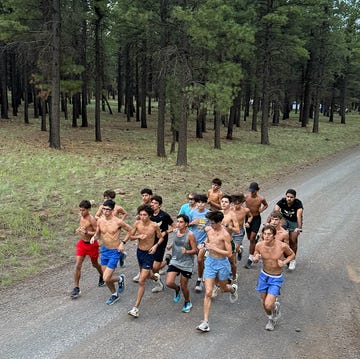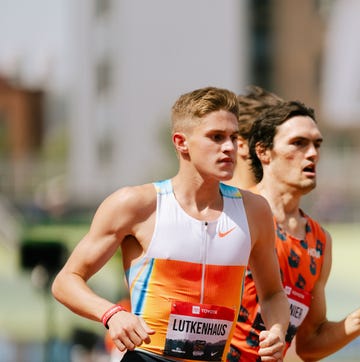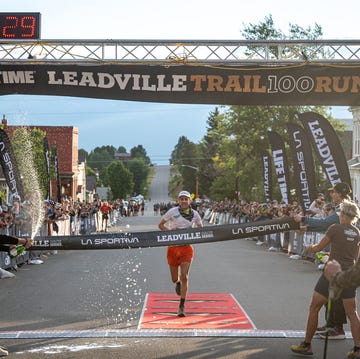Hamburg, April 2013: 1st, 2:05:30
 picture alliance//Getty Images
picture alliance//Getty ImagesAfter a track career that included a world championship at 5,000 meters and two Olympic medals in the distance, Kipchoge converted to road racing in 2012. He began his marathon career, appropriately enough, with a win, and a resounding one at that—second place was more than two minutes behind.
Berlin, September 2013: 2nd, 2:04:05
 picture alliance//Getty Images
picture alliance//Getty ImagesFor his second marathon, Kipchoge chose Berlin, the site of much future greatness. He finished second in a then-PR of 2:04:05 behind a world record of 2:03:23 by Wilson Kipsang. It was to be his only defeat in the marathon for seven years.
Advertisement - Continue Reading Below
Rotterdam, April 2014: 1st, 2:05:00
 MARCO DE SWART//Getty Images
MARCO DE SWART//Getty ImagesAnother easy win—second place was more than a minute back—gave Kipchoge a little more experience before he became a fixture at the world’s highest-profile marathons.
Chicago, October 2014: 1st, 2:04:11
 Jonathan Daniel//Getty Images
Jonathan Daniel//Getty ImagesKipchoge won his first World Marathon Major title in his first road race in the United States. After this race, there was no doubting his alpha status at whatever marathon he ran.
Advertisement - Continue Reading Below
London, April 2015: 1st, 2:04:42
 Charlie Crowhurst//Getty Images
Charlie Crowhurst//Getty ImagesIn the first of his three London victories, Kipchoge furthered his claim to being the world’s best male marathoner by beating the two most recent holders of the world record.
Berlin, September 2015: 1st, 2:04:00
 Pacific Press//Getty Images
Pacific Press//Getty ImagesWhat a flop—for his shoes, that is. Running in a Nike prototype, Kipchoge lost any chance at breaking the world record when the insoles of his shoes came loose in the first 10K. Kipchoge ran the bulk of the race with the insoles perpendicular to his feet. Setting a PR under these conditions probably added to his aura of invincibility more than breaking the world record would have.
Advertisement - Continue Reading Below
London, April 2016: 1st, 2:03:05
 Alex Morton//Getty Images
Alex Morton//Getty ImagesAnother London appearance, another dominant win for Kipchoge, this time in a course record.
Rio Olympics, August 2016: 1st, 2:08:44
 Ramsey Cardy//Getty Images
Ramsey Cardy//Getty ImagesIn one of the most nonchalant Olympic victories in history, Kipchoge took a solo lead seemingly at will after 20 miles and gapped runner-up Feyisa Lilesa by 70 seconds over the final 10K.
Advertisement - Continue Reading Below
Breaking2 demo in Italy, May 2017: 1st, 2:00:25
 Pier Marco Tacca//Getty Images
Pier Marco Tacca//Getty ImagesKipchoge was the star of this three-man exhibition around an auto-racing track. Following a car and a rotating cast of pacers, Kipchoge came up a little short of the event’s goal of a sub-2:00 marathon. His time was the fastest then run under any conditions for a marathon, but didn’t count for world-record purposes.
Berlin, September 2017: 1st, 2:03:32
 Alexander Hassenstein//Getty Images
Alexander Hassenstein//Getty ImagesWarm, muggy conditions scotched any attempt at the official world record, so Kipchoge had to be content with “just” another World Marathon Major win.
Advertisement - Continue Reading Below
London, April 2018: 1st, 2:04:17
 NurPhoto//Getty Images
NurPhoto//Getty ImagesAnother hot day meant no go at the world record and simply dominating a world-class field
Berlin, September 2018: 1st, 2:01:39
 Maja Hitij//Getty Images
Maja Hitij//Getty ImagesFinally, ideal weather gave Kipchoge the chance to break the official world record. And break it he did, taking 1:18 off the previous mark, for the biggest such margin in 41 years.
Advertisement - Continue Reading Below
London, April 2019: 1st, 2:02:37
 NurPhoto//Getty Images
NurPhoto//Getty ImagesBy this point, Kipchoge had become otherworldly. Setting the London course in a time that only one other marathoner had surpassed was seen as just another day at the office.
Ineos demo in Austria, October 2019: 1st (and only), 1:59:40
 NurPhoto//Getty Images
NurPhoto//Getty ImagesKipchoge did what many people said was impossible—run a marathon in under two hours. He averaged 4:33.9 per mile for 26.2 miles. But his time was ineligible for the world record because of rotating groups of pacers and other deviations from standards for road records.
Advertisement - Continue Reading Below
London, October 2020, 8th, 2:06:49
 Pool//Getty Images
Pool//Getty ImagesKipchoge showed a rare touch of vulnerability in his first loss since 2013 and the worst placing of his marathon career. Kipchoge attributed the off day to a head cold. Others wondered if Kipchoge, a month shy of his 36th birthday, had finally started to lose his race with Father Time.
NN Marathon in Eschende, April 2021: 1st, 2:04:30
 Dean Mouhtaropoulos//Getty Images
Dean Mouhtaropoulos//Getty ImagesWith mass events still on hold, Kipchoge’s management team put together an elite-only marathon at a XXX in Holland. Kipchoge won easily. The race served as a confidence booster after the previous fall’s rare defeat and as a tune-up for Kipchoge’s Olympic title defense four months later.
Advertisement - Continue Reading Below
Tokyo Olympics, August 2021: 1st, 2:08:38
 Lintao Zhang//Getty Images
Lintao Zhang//Getty ImagesWell, so much for Kipchoge starting to slip. He became only the third person to successfully defend an Olympic marathon title. His winning margin of 1:20 was the largest in an Olympic marathon since 1960.
Tokyo, March 2022: 1st, 2:02:40
 Anadolu Agency//Getty Images
Anadolu Agency//Getty ImagesAfter the Olympics, Kipchoge said that he wanted to win all six of the World Marathon Majors. He got his fourth title in his first go at Tokyo, and set the course record in the process.
Advertisement - Continue Reading Below
Berlin, September 2022: 1st, 2:01:09
 Marvin Ibo Guengoer - GES Sportfoto//Getty Images
Marvin Ibo Guengoer - GES Sportfoto//Getty ImagesSome speculated Kipchoge would run New York City to cross off another World Marathon Major win. But when he announced he would instead return to Berlin, that meant one thing—he would try to break his own world record. And he did, by 30 seconds, reviving talk of a sub-2:00 marathon in a record-eligible race.
Boston, April 2023: 6th, 2:09:23
 Maddie Meyer//Getty Images
Maddie Meyer//Getty ImagesEliud Kipchoge placed sixth at the 2023 Boston Marathon in 2:09:23, more than three minutes behind winner Evans Chebet of Kenya. After setting the pace through the first 19 miles, Kipchoge lost contact with the leaders and could not recover.

Scott is a veteran running, fitness, and health journalist who has held senior editorial positions at Runner's World and Running Times. Much of his writing translates sport science research and elite best practices into practical guidance for everyday athletes. He is the author or coauthor of several running books, including Running Is My Therapy, Advanced Marathoning, and Meb for Mortals. Scott has also written about running for Slate, The Atlantic, the Washington Post, and other members of the sedentary media. His lifetime running odometer is past 110,000 miles, but he's as much in love as ever.
Advertisement - Continue Reading Below
Readers Also Read
Advertisement - Continue Reading Below
Advertisement - Continue Reading Below

































